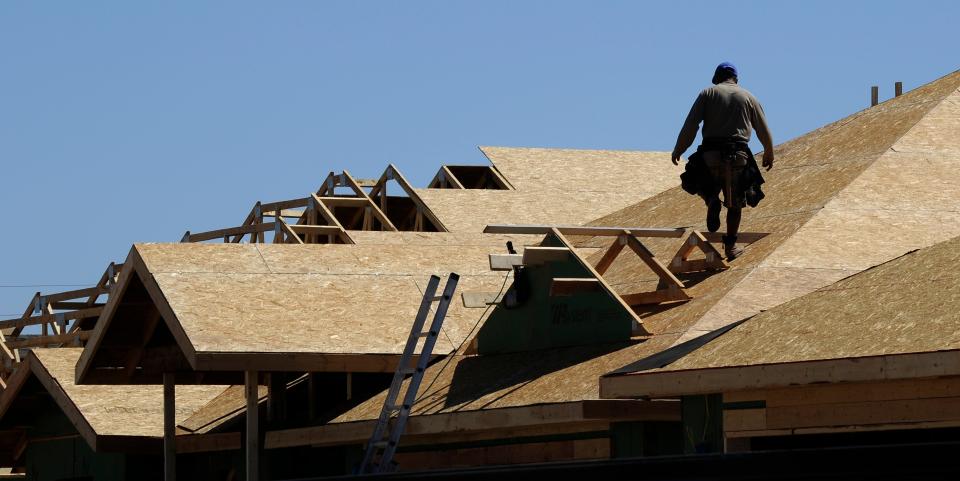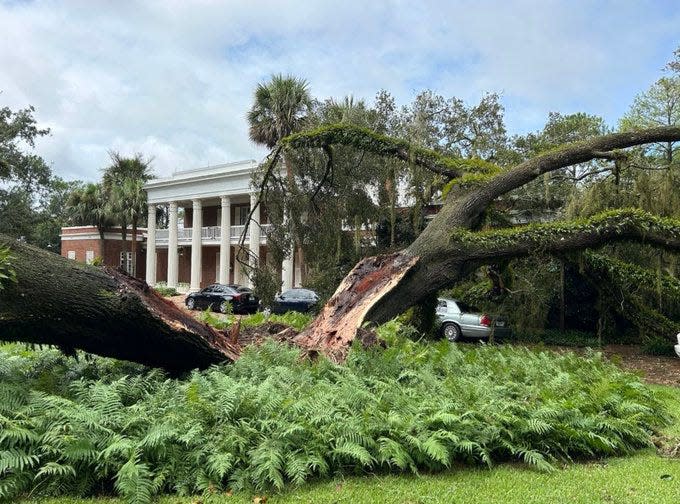After Hurricane Idalia passes, the scammers come out. Here's how to avoid getting scammed
Hurricane Idalia has come and gone, and you're left to pick up the pieces. Your home may be damaged or even unliveable. Your vehicle may be flooded. You are exhausted and anxious and worried and as vulnerable as you've ever been.
That's when the scammers show up. After every disaster, scam artists, fake contractors, identity thieves, suspicious-looking FEMA agents and other terribly helpful, highly unscrupulous people will use this opportunity to take your money. You may find that you've allowed someone to collect insurance money on your behalf that you'll never see again, or paid for construction services that will never happen or were grossly overcharged.
Here are some tips to help avoid scams. The most common ones, according to the Florida Attorney General's Office, are repair scams, tree service scams, and water testing and treatment scams, but there are others to watch for.
Make sure your contractor is licensed

When your house has been flooded or had a tree fall on it and you're desperate, a friendly contractor willing to help you out sounds like a godsend. But be cautious.
First and foremost, make sure they are licensed. It is illegal for a contractor to work in Florida without a license. If you're not sure, check their licensing status at MyFloridaLicense.com or call the Florida Attorney General’s Office at 1-866-9NO-SCAM.
Be wary of anyone who approaches you unsolicited and offers to work at a discount with supplies left from a previous job.
Have your home's damage evaluated by your insurer before you contract for repairs to make sure they'll be covered.
Get at least three written, itemized estimates on repairs.
Research the company with the Better Business Bureau at BBB.org. You also can search their name for previous complaints for unlicensed work.
Check for proof of insurance and verify with the insurer that it's current.
An Assignment of Benefits (AOB) allows third-parties to collect your insurance benefits without your involvement. This can help speed things up as the contractor can then work directly with the insurance company. But only do this with people you trust, and be wary of any contractor or company that insists on an AOB to do any repairs. Do not sign blank or incomplete AOB forms or contracts.
Never pay the full amount of a repair job upfront. Avoid giving a large deposit.
Insist on releases from any liens that could be placed on the property prior to making final payment.
Do not sign a certificate of completion until you are completely satisfied.
Document everything. Take pictures of the contractor's license, their face, their car and license plate.
Keep an eye on the tree removal people

Got a massive tree leaning on your house, crushing your vehicle or blocking your driveway? Here comes the smiling guy with the chainsaw and crew to help you get back to a normal life.
Be wary of anyone who approaches you unsolicited and offers tree removal.
Get multiple written estimates and ask if debris removal and stump grinding are included in the quote.
Research the company with the Better Business Bureau at BBB.org.
Check for proof of insurance and verify with the insurer that it's current.
Never pay the full amount up front.
Getting your water tested
Heavy rains, storm surge and flooding can affect water mains and personal wells. It is important to have your water checked, but make sure it's legit.
If someone claiming to be a utility provider representative asks to inspect a water line or well, ask for ID.
Get suspicious if they're offering "free" water tests. They'll likely just trying to sell you their water treatment system.
If you need your water tested, you can find approved water testing labs at appprod.dep.state.fl.us/labs/cgi-bin/aams/index.asp or you can get information on qualified testing laboratories from the Florida Department of Health at 850-245-4444 or your local health department.
Verify the friendly FEMA agent
It can be such a relief to see agents from FEMA or the U.S. Small Business Administration promptly appear right after a storm. It can be such a relief that you don't look at them too closely.
Government agents will always have official badges with photo IDs, and will never charge applicants for disaster assistance, inspections or help in filling out applications, according to FEMA. They will never call or text you asking for financial account information. There is no fee required to apply for or to get disaster assistance from the Federal Emergency Management Agency, the U.S. Small Business Administration or the state.
"Don’t believe anyone who promises a disaster grant in return for payment," FEMA wrote in a 2022 news release. "Be wary of unexpected phone calls or visits to your home from people claiming to be FEMA housing inspectors or people claiming they work for FEMA. FEMA representatives will have your FEMA application number."
If you suspect fraudulent activity surrounding FEMA, you can report it to StopFEMAFraud@fema.dhs.gov, fax: 202-212-4926 or write to: FEMA Fraud and Internal Investigation Division, 400 C Street SW Mail Stop 3005, Washington, DC 20472.
Be careful what you click on

Email scams are common after a major weather event, John Joyce, regional corporate security manager for Regions Bank in Tampa, said, and Florida is the second-biggest target in the U.S. for online scams. Bad actors tend to use email and text scams, posing as someone's bank, or even as FEMA, and once the victim clicks on a link, their personal information is compromised.
Be wary of email attachments as well, Joyce said. Clicking on one could start the installation of malware on a computer.
"Never give out personal information to an email or a text unless it is solicited by you," Joyce said. "Anything that comes in unsolicited posing as a bank, verify that to make sure it’s the legitimate group that is contacting you."
This article originally appeared on The Daytona Beach News-Journal: Hurricane Idalia scams, fake contractors likely. How to avoid them

